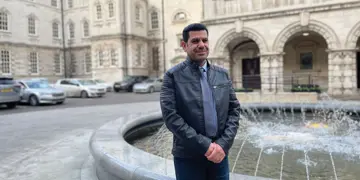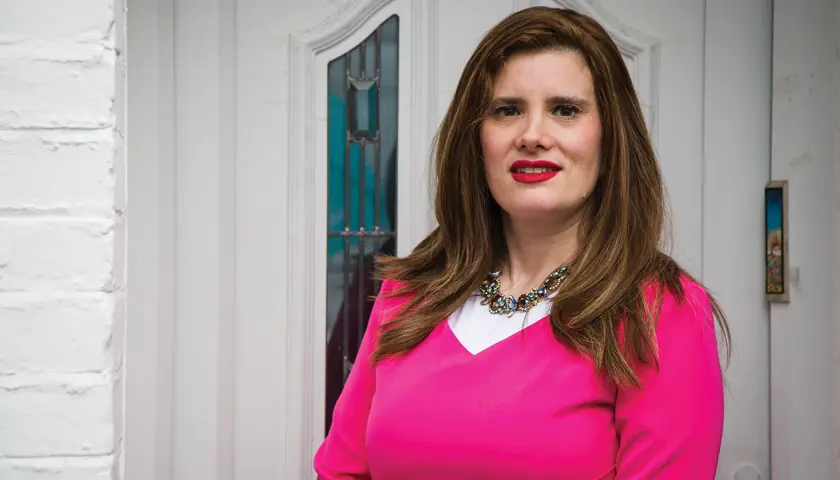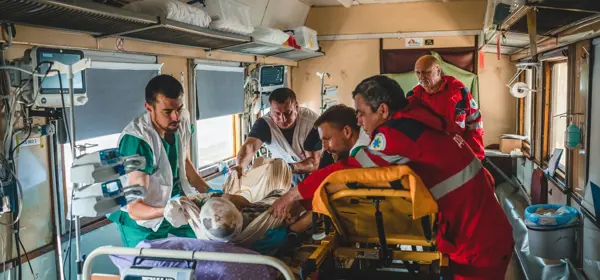Here to help: refugee doctors
Here to help: refugee doctors
Doctors who desperately want to work, in a country that desperately needs doctors – but it’s far from simple for those leaving war-torn countries to practise in the UK. Jennifer Trueland meets two who are benefiting from a scheme to help their language skills, while Tim Tonkin hears about an initiative which offers continuing medical education
Northern Ireland’s health service has the longest waiting times in the UK and an acute medical workforce shortage.
Yet at the same time there are qualified and highly experienced doctors living in Belfast who are desperate to work – but are unable to.
These are refugee doctors who have fled their war-torn homelands and made often-hazardous journeys to reach safety. But there are many barriers to them being able to take up posts in the UK, with the need to bring language skills up to scratch being an important part of them.
Now, Belfast City Council is trying to combat that. The first cohort of doctors are taking part in its English Language Support Academy for medics, the first of its kind in Northern Ireland.
The programme aims to help experienced doctors to navigate the process to register and verify their qualifications and prepare for advanced English tests and medical exams to ensure they are qualified to practise medicine in the UK.
Every time I try to get a clinical attachment here, there’s nothing
Ghaleb Daher
It’s a programme that should bring benefits to the doctors themselves and to patients – many of whom are waiting years for much-needed treatment.
Ghaleb Daher (pictured top), 51, an orthopaedic surgeon from Syria, came to Belfast as a refugee in 2019. He has welcomed to opportunity to take part in the Belfast City Council programme as he is desperate to put his surgical skills to good use.
Having failed to pass the OET (occupational English test), Dr Daher, who travelled to Belfast with his wife and children, switched tack and made three attempts to pass the member of the royal college of surgeons’ exam – in the last try, he missed a pass mark by five points.
Speaking to The Doctor magazine before recent events in Syria, which saw the toppling of Bashar al-Assad, he described his frustration and not being able to surmount these barriers. ‘I was a bit depressed, I was thinking “why, why why?”. But then I heard Belfast City Council would like to help refugee doctors and now I am preparing for [the] OET and PLAB [professional and linguistic assessments board].’
Having worked as an orthopaedic surgeon for many years – firstly in Syria, then in Lebanon and Saudi Arabia – he is keen to push forward and practise in the UK. It’s been difficult, however. ‘Every time I try to get a clinical attachment here, there’s nothing,’ he says. ‘But every day, I get messages from friends in Syria, sending me X-rays and pictures to get my opinion about [them]. Maybe 10 times a day.’
Ready to work
He and his wife, an English teacher, left Syria in 2013. ‘It was impossible to stay. If I wanted to protect my life, and my family, it was impossible. If you stay in Syria, people come to you and say, “you are a doctor, you are rich, give me money, give me everything”. A colleague refused to give them any money and that meant a gunshot – he died.’
Everything he owned in Syria – including his house – was destroyed. Doctors are also told to give up their lives and go to the war zone to work with soldiers, he adds – but this is fraught with difficulties. He knows a former colleague who performed an operation on a soldier against the Government and who died in prison. Another is still in prison 10 years later.
‘This is from the two “sides” – the Government will do this to you, and those against the Government will also do it to you.’
Belfast is a nice city, he says – although arriving just before the COVID lockdowns did make settling in quite challenging. ‘Everything is good. There’s a good school, there are nice people, quiet people, and anyone you meet is ready to give you support.’
The English Language Support Academy is funded by Belfast City Council and the Belfast Labour Market Partnership. It is also supported other organisations including the Belfast Trust, Department of Health, and Queen’s University, Belfast and REACHE Project Manchester.
Belfast Lord Mayor Councillor Micky Murray expressed gratitude to the other agencies. ‘I hope these talented medical professionals feel well supported and welcomed as they study and work to become much-needed members of Belfast’s healthcare workforce.’
Support at hand
International medical graduates need to undergo rigorous assessments before they can practise in the UK, but aid is available
While not all doctors taking shelter in this country necessarily hold refugee status, requirements for obtaining a licence to practise medicine are the same for all.
Before any international medical graduate doctor can hope to resume their clinical duties in the UK, they must undertake a series of rigorous assessments.
These include passing evaluations of English-language skills encompassing speaking, writing, reading and listening abilities and completing a two-stage assessment of clinical skills known as the Professional and Linguistic Assessments Board. Doctors must also undertake an unpaid clinical attachment in the NHS usually lasting four to eight weeks, to familiarise themselves with UK medical practice.
These requirements, while understandable in their necessity, can sometimes seem insurmountable to those who find themselves in new and uncertain surroundings often arriving with only the traumatic memories of the homelands they had to leave.
Fortunately, there are a variety of sources of support available to doctors.
Through its refugee doctor initiative, the BMA provides measures including support through its international department, free access to the BMJ and to the association’s 24-hour phone-counselling service, with around 900 refugee doctors being supported by the initiative.
The GMC meanwhile will aid doctors granted refugee status by helping them get primary and postgraduate medical qualifications independently verified, and by providing financial assistance with registration fees.
Restoring hope
The Crisis Rescue Foundation seeks to support medical students and doctors whose education has been disrupted
Having to leave your home and normal life behind and start again in a new and unfamiliar land owing to conflict or crisis is an enormously daunting prospect for any human being. For doctors who seek refuge in the UK after fleeing from overseas, the process of restarting their career is often onerous and far from straightforward.
Ukrainian paediatrician Olena* arrived in the UK in late 2022, having had to flee her home country owing to the devastation wrought by the Russian invasion. Having departed Ukraine when heavily pregnant, she fled initially to Poland before coming to the UK where she and her newborn son were joined by her husband. Despite having been in the country for two years and eager to put her clinical skills to good use, Olena is yet to secure a licence to practise.
‘We thought we would spend our entire lives in Ukraine, but one day [the date of the Russian invasion] changed everything,’ she says. ‘When the war started, I was nine months pregnant, so it was a very difficult decision for our family to move on abroad. I’m not working right now because it’s not allowed here to work without registration, but I’m continuing my studying because I want to stay up to date. It is difficult because I don’t know what happens next or how long I will be here. I’m always thinking about my friends from university who are still living in Kyiv or in the eastern parts of Ukraine.’
There is also a raft of voluntary and charitable organisations that provide assistance to refugees in general but specifically to doctors and healthcare professionals who have sought asylum in the UK.
The Crisis Rescue Foundation is one such group and has been helping medical students and doctors in countries disrupted by war or other crises to continue their education through its medical school elective programme, a free-to-access series of online lectures.
The programme, which was set up in 2022 partly in response to the war in Ukraine, has also sought to support medical professionals who have relocated to the UK through in-person events focusing on Professional and Linguistic Assessments Board exams and UK medical practice.
‘I have received countless, at times, heartbreaking communications from refugee medics from various countries affected by war and national crisis who have struggled to reach the UK, access medical education, support and eventually work as a doctor here,’ says programme founder and GP Sharon Raymond.
‘These challenging experiences prompted the establishment of the CRF medical school UK elective programme. For more than two and a half years, we have had the privilege of supporting refugee doctors from the start of their often arduous journey to finally achieving work as doctors in the NHS; whilst still overseas, they have joined our online medical lectures, peer support and wellbeing sessions as refugees in the UK [and] they have participated in our in-person PLAB/ UKMLA training days.’
Dr Raymond says the CRF has also helped the doctors arrange more than 60 clinical placements, and it has provided guidance to help them secure work as a doctor in the UK, online and at events supported by organisations such as the GMC, BMA and MDU.
No one really tells you how you find work to begin with. I think there could be a lot more support
Samira*
One of those assisted by the programme is Samira* who came to the UK from Sudan 18 months ago. As a UK-born dual Sudanese and British national, Samira is not a refugee but had no prior experience of training or practising in the UK until her arrival last year. Having completed her medical training in Sudan during years in which the country was riven by revolution and then civil war, she says that she has found the transition to the UK far from straightforward.
‘I would say that the experience of being a Sudanese doctor has, you know, has been quite difficult,’ she explains. ‘With the revolution, there were a lot of pauses when it came to education and a lot of struggles, that took a toll on the whole country.’
Since coming to the UK and with support from organisations such as the CRF, Samira has undertaken her English language and PLAB assessments and recently completed a clinical attachment. Despite making progress with the support of the CRF, she feels that too little is done at a national level to help refugee doctors navigate UK medical systems and into the medical workforce.
‘I’ve been here for a year and a half now and completed all my exams but I’m still looking for work,’ Samira explains. ‘There’s no guidance really on how to achieve that – no one really tells you how you find work to begin with. I think there could be a lot more support, especially after registration.’
(Top photo by Jennifer Trueland)
* Some names have been changed




